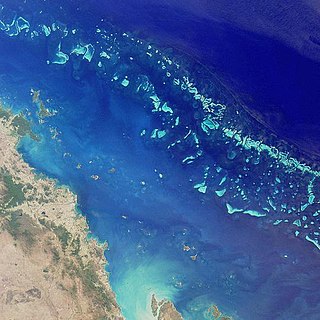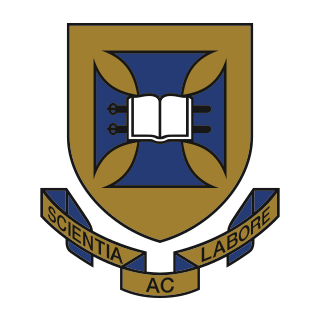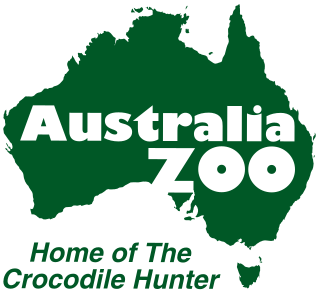
Queensland is a state situated in northeastern Australia, and is the second-largest and third-most populous Australian state. It is bordered by the Northern Territory, South Australia and New South Wales to the west, south-west and south respectively. To the east, Queensland is bordered by the Coral Sea and the Pacific Ocean. To its north is the Torres Strait, separating the Australian mainland from Papua New Guinea. With an area of 1,852,642 square kilometres (715,309 sq mi), Queensland is the world's sixth-largest sub-national entity, and is larger than all but 15 countries. Due to its size, Queensland's geographical features and climates are diverse, including tropical rainforests, rivers, coral reefs, mountain ranges and sandy beaches in its tropical and sub-tropical coastal regions, as well as deserts and savanna in the semi-arid and desert climatic regions of its interior.

The Great Barrier Reef is the world's largest coral reef system composed of over 2,900 individual reefs and 900 islands stretching for over 2,300 kilometres (1,400 mi) over an area of approximately 344,400 square kilometres (133,000 sq mi). The reef is located in the Coral Sea, off the coast of Queensland, Australia. The Great Barrier Reef can be seen from outer space and is the world's biggest single structure made by living organisms. This reef structure is composed of and built by billions of tiny organisms, known as coral polyps. It supports a wide diversity of life and was selected as a World Heritage Site in 1981. CNN labelled it one of the seven natural wonders of the world. The Queensland National Trust named it a state icon of Queensland.

Blue Lake National Park was a former protected area in Queensland, Australia, located on North Stradbroke Island about 44 kilometres (27 mi) east of Brisbane. Blue Lake National Park is now a part of the Naree Budjong Djara National Park. Access was provided by road 9 kilometres (5.6 mi) west of Dunwich.

The University of Queensland (UQ), also known as Queensland University, is a public research university located primarily in Brisbane, the capital city of the Australian state of Queensland. Founded in 1909 by the Queensland parliament, UQ is one of the six sandstone universities, an informal designation of the oldest university in each state. In 2018, the University of Queensland was ranked second nationally by the Australian Research Council and equal second in Australia based on the average of four major global university league tables. The University of Queensland is a founding member of edX, Australia's research-intensive Group of Eight and the global Universitas 21 network.

Macrotis is a genus of desert-dwelling marsupial omnivores known as bilbies or rabbit-bandicoots; they are members of the order Peramelemorphia. At the time of European colonisation of Australia, there were two species. The lesser bilby became extinct in the 1950s; the greater bilby survives but remains endangered. It is currently listed as a vulnerable species. It is on average 55 cm (22 in) long, excluding the tail, which is usually around 29 cm (11 in) long. Its fur is usually grey or white, it has a long pointy nose and very long ears, hence earning its nick-name, the rabbit-eared bandicoot.

The regent honeyeater is a critically endangered bird endemic to southeastern Australia. It is commonly considered a flagship species within its range, with the efforts going into its conservation having positive effects on many other species that share its habitat. Recent genetic research suggests it is closely related to the wattlebirds.

A shark attack is an attack on a human by a shark. Every year, around 80 unprovoked attacks are reported worldwide. Despite their rarity, many people fear shark attacks after occasional serial attacks, such as the Jersey Shore shark attacks of 1916, and horror fiction and films such as the Jaws series. Out of more than 489 shark species, only three are responsible for a double-digit number of fatal, unprovoked attacks on humans: the great white, tiger, and bull. The oceanic whitetip has probably killed many more castaways, but these are not recorded in the statistics.

Cape York Peninsula is a large remote peninsula located in Far North Queensland, Australia. It is the largest unspoiled wilderness in northern Australia. The land is mostly flat and about half of the area is used for grazing cattle. The relatively undisturbed eucalyptus-wooded savannahs, tropical rainforests and other types of habitat are now recognized and preserved for their global environmental significance. Although much of the peninsula remains pristine, with a diverse repertoire of endemic flora and fauna, some of its wildlife may be threatened by industry and overgrazing as well as introduced species and weeds.

The Gemfields is a former locality in the Central Highlands Region, Queensland, Australia. In the 2016 census, The Gemfields had a population of 1,449 people. On 17 April 2020, the Queensland Government re-drew the boundaries of localities within the Central Highlands Region by removing the locality of The Gemfields in order to create three new localities of Rubyvale, Sapphire Central and Anakie Siding.

Gladstone is a city in the. It is 517 km (321 mi) by road north-west of the state capital, Brisbane, and 108 km (67 mi) south-east of Rockhampton. Situated between the Calliope and Boyne Rivers, Gladstone is home to Queensland's largest multi-commodity shipping port, the Port of Gladstone.

Mackay is a city in the Mackay Region on the eastern or Coral Sea coast of Queensland, Australia. It is located about 970 kilometres (603 mi) north of Brisbane, on the Pioneer River. Mackay is nicknamed the sugar capital of Australia because its region produces more than a third of Australia's sugar. In June 2018, Mackay had a population of 80,148, having decreased slightly at an average annual rate of -0.32% year-on-year over the preceding five years.

Australia Zoo is a 1,000-acre (400 ha) zoo located in the Australian state of Queensland on the Sunshine Coast near Beerwah/Glass House Mountains. It is a member of the Zoo and Aquarium Association (ZAA), and is owned by Terri Irwin, the widow of Steve Irwin, whose wildlife documentary series The Crocodile Hunter made the zoo a popular tourist attraction. The zoo is run by Director Wes Mannion.

Queensland Firebirds are an Australian netball team based in Brisbane, Queensland. Since 2017 they have played in Suncorp Super Netball. Between 2008 and 2016, they played in the ANZ Championship and between 1997 and 2007, they played in the Commonwealth Bank Trophy. Firebirds were the most successful team during the ANZ Championship era, playing in five grand finals and winning three premierships; in 2011, 2015 and 2016. They were the only team to win back to back ANZ Championship titles.
A drum line is an unmanned aquatic trap used to lure and capture large sharks using baited hooks. They are typically deployed near popular swimming beaches with the intention of reducing the number of sharks in the vicinity and therefore the probability of shark attack. Drum lines are often used in association with shark nets, with the intent of killing sharks. However SMART drum lines can be used to move sharks, which greatly reduces shark and bycatch mortality. The use of drum lines has been successful in reducing shark attacks in the areas where they are installed. The topic of shark culling became an international controversy and sparked public demonstrations and vocal opposition, particularly from environmentalists, animal welfare advocates and ocean activists.
Hygrochloa is a genus of Australian plants in the grass family.
Stephanie Wood, also known as Steph Wood, is an Australia netball international. Wood was a member of the Australia teams that won the silver medals at the 2018 Commonwealth Games and at the 2019 Netball World Cup. Between 2015 and 2016, Wood played for New South Wales Swifts in the ANZ Championship. Since 2017 she has played for Sunshine Coast Lightning in Suncorp Super Netball. Between 2015 and 2019, she played and scored in five successive grand finals, winning premierships with Sunshine Coast Lightning in 2017 and 2018.
The 2018–19 Women's National Cricket League season was the 23rd season of the Women's National Cricket League, the women's domestic limited overs cricket competition in Australia. The tournament started on 21 September 2018 and finished on 9 February 2019.

Shark culling is the deliberate killing of sharks by government authorities, usually in response to one or more shark attacks. The term "shark control" is often used by governments when referring to culls. Shark culling has been criticized by environmentalists, conservationists and animal welfare advocates—they say killing sharks harms the marine ecosystem and is unethical. Government officials often cite public safety as a reason for culling. The impact of culling is also minor compared to bycatch with 50 million sharks caught each year by the commercial fishing industry.
The 2019–20 Women's National Cricket League season was the 24th season of the Women's National Cricket League, the women's domestic limited overs cricket competition in Australia. Under an expanded schedule, each of the seven teams played eight round robin games, up from the six played by all teams in each of the previous nine seasons. The tournament commenced on 22 September 2019 and finished on 16 February 2020.













